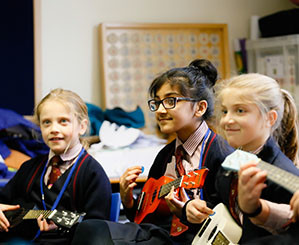It is half past four on the first Thursday of a new term. I’ve just finished my daily stint on the front door to see our pupils off home at the end of the day, complimented a few on the quality of their bobble hats and received a recommendation to listen to the ‘classic’ Thin Lizzy album ‘Live and Dangerous’ (my liking for ‘dad rock’ no longer being a secret). Now in my office looking out over the Governors’ Lawn I can see that the sky isn’t entirely grim, there’s washed-out blue behind our trees and no trace of the ‘thunder snow’, (which might conceivably be the name of a Metallica support act), which was promised.
So, it’s the first week back in the New Year, snow threatens but the days are getting longer and we are up and running.
The Bradford Grammar assembly themes for 2017 have begun with ‘Happiness and Wellbeing’, a topic chosen with great prescience it would now seem in light of Theresa May’s ‘shared society’ speech on Monday in which she affirmed the Government’s commitment to reform mental health services for our young people. It is tremendously encouraging to read that Mrs May has recognised the clear need for our nation to ‘transform’ attitudes to mental health and invest in practical action for vulnerable teenagers. The media have expanded on the issue, quick to paint a picture of need. Statistics have been reported that show one in four people experience a mental health problem at some point in their lives with young people affected disproportionally. Additionally, it has been illustrated that over a half of mental health issues start by the age of 14 and three quarters by 18 with young women at greatest risk.
In response to this ‘crisis’, if that is what it is, Mrs May has promised that every secondary school will be offered mental first aid training to teach staff how to spot symptoms in potential sufferers, greater links between NHS services and schools, £15m to help fund community care initiatives and a reallocation of £67.7m from the NHS digitisation fund for online services. If it comes to fruition, such activity would be welcomed in our home city of Bradford and across the nation no doubt; but we’ve heard something similar before from David Cameron. His pledge amounted to very little in these cash-strapped times. Meanwhile, at ground level we notice further cuts to health services for children such as CAMHS – Young Minds. Furthermore, we might be forgiven if we are a little cynical about the potential value of the proposed web-based advice and diagnosis service for young people (thanks to an online algorithm) in lieu of a warm and compassionate interaction with a trained professional (and human being).
Independent schools, and in particular those like Bradford Grammar School that belong to the Headmasters’ and Headmistresses’ Conference or HMC, have in recent years been at the forefront of the debate about teenage mental health. Schools such as ours have been brave and open about the nature and scale of the problem, innovative at finding solutions and generous in sharing these with colleagues elsewhere. At Bradford Grammar School we have always placed a premium on our pastoral care, proactive Personal Development (PSHE) programme, fostering of a broad range of interests outside the classroom and nurturing resilient and characterful young people able to navigate complex modern life, roll with the punches and make the most of opportunities. We are fortunate to have tutors and Heads of Year who know our pupils individually and care about them greatly, and who are supported by our dedicated school nurses and counsellors.
Mrs Jane Chapman, Assistant Head (Pastoral), leads on pupil welfare at Bradford Grammar School. During the course of last year she has been instrumental in providing talks for pupils, parents and staff from, amongst others, teenage mental health expert Dick Moore and Cyber Problem Solvers PCSOs Steve Atkinson and Izac Spencer from West Yorkshire Police. Another talk on teenage mental health with Jeremy Thomas is planned for 26 January, you are all invited.
Meanwhile, whole staff sessions to raise awareness and for some to become mental health first aiders have been put on. Year 13 students have also been formally trained as peer mentors and BGS has hosted and led Spiritual, Moral, Social and Cultural education (SMSC) seminars and CPD sessions for educators from across the region. Like many other HMC schools, at BGS we do our bit. Quite understandably it has been observed by some that the independent sector is fortunate to be able to devote greater resources to such pastoral activity than our colleagues in the state sector. But the national lead on mental health provided by HMC and others continues to benefit all children and the work of schools like BGS within their local communities can have a powerful, positive effect. We all want the best for our nation’s youth.
So, what to say next Monday as our assembly theme of ‘Happiness and Wellbeing’ continues? This week the message was about reflecting and taking control – being agentive – and accepting that both triumph and failure are part of the mix in any happy and successful life, however we might define those things for ourselves. Next week…? Well, I don’t know yet. But I’m in possession of the aforementioned Thin Lizzy live double album at home (I know, HMC Headmasters aren’t typically heavy rock devotees) and it’s a cracker! Perhaps it might get a mention in assembly as an ingredient of at least one person’s happiness.
Watch out for Bradford Grammar School’s Spotlight on Happiness campaign coming on the ‘International Day of Happiness’, 20 March 2017. The online resource will be dedicated to children, young people and adults to learn about wellbeing in school and why it’s so important.
“We are fortunate to have tutors and Heads of Year who know our pupils individually and care about them greatly, and who are supported by our dedicated school nurses and counsellors.”
